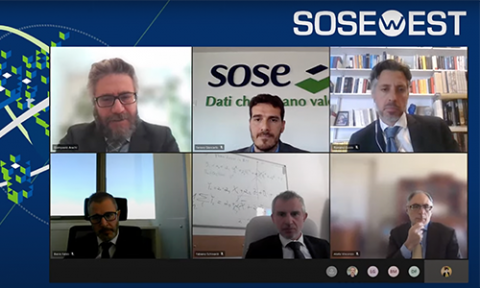Avviso
Dal 1° gennaio 2024 diventa operativa l'incorporazione di SOSE in Sogei, come previsto dalla legge n.112 del 2023 che ha disposto la fusione della società.
A tal fine tutte le comunicazioni Sose si trovano sul sito Sogei www.sogei.it.

The emergency ecosystem, chosen as the title of the # SOSEWest2021 digital workshop, gathered around a virtual table the experts from the institutions and the academic world who contributed to the elaboration and adoption of policies to face the ongoing emergency affecting the health care and the socio-economic systems.
The main issues addressed within #SOSEWEST were three:
- the impact of the crisis on the economic fabric of Italian companies by Prof. Fabiano Schivardi;
- the opportunities and perspectives deriving from the NRRP - National Recovery and Resilience Plan, aiming at economic and social recovery by relaunching local public services by Prof. Giampaolo Arachi, President of the Technical Committee for Standard Expenditure Needs and professor of Finance at the University of Salento;
- the future economic scenarios and data-based predictive analyses, by Guido Romano, Economist and Head of the Studies and External Relations Office at Cerved Group.
Prof. Schivardi, Economist at Luiss, explained: "At the beginning of 2020, Guido Romano of Cerved and I calculated how many companies were illiquid: almost 250 thousand joint-stock companies had liquidity problems". "According to our simulations - Schivardi continued - the measures adopted in 2020 have prevented even more dramatic scenarios than the actual. Now we need definite choices - Schivardi added - focusing on European resources to get out of an emergency approach and help viable companies. Furthermore, - he concluded - it is crucial to identify on the market the areas exposed to bankruptcy to guide interventions".
"The data-driven approach is part of our strategy to grow together with the country" - were the words used by Guido Romano to introduce his report. The Economist heads the Research and External Relations Office of Cerved Group, which carries out sectoral forecasts on credit risk for over 230 sectors, particularly impacted by Covid in this period.
"We have forecast two scenarios: a base-case and a worst-case. Our forecasts are very granular and cover over 1600 Ateco codes. Guido Romano explained: “Cerved recorded a strong asymmetry of the Covid in the different sectors. For example, the events sector and airports were hit hard, while the photovoltaics and ICT registered considerable growth. According to our estimates, during the lockdown, non-payments rose strongly and then returned to pre-Covid levels: from 17.7% at the beginning of the year to 13.6% at the end of 2020, in line with 13.3 in 2019." "21% of companies are at default risk, and in the base scenario, more than 50% are experiencing a situation of risk or vulnerability. The potential impact on employment - Guido Romano concluded - is very strong: almost 2 million fewer workers and a loss of 65 billion in the capital in the most severe scenario".
The economic crisis has not only affected people and businesses: local authorities have also suffered a real fiscal shock, which has upset the cash balance both in terms of income and expenditure.
"How can the NRRP contribute to the implementation of the Essential Service Levels (Italian acronym - LEP)?" was the question made ideally by Prof. Giampaolo Arachi, professor of Finance at the University of Salento, to the audience. "The National Recovery and Resilience Plan aims to reduce territorial asymmetries by focusing on service levels, which, according to the Constitution, should be uniform throughout the territory. The NRRP - Prof. Arachi continued - provides for interventions in many functions carried out by local authorities: nursery schools, preschools, waste management, social care, and transport. These resources are relevant, for example, in education, social care, and transport. The potential of NRRP is great, but it is also necessary to overcome some critical issues: the choice of territories on which to concentrate interventions, the coordination of infrastructural interventions, the financing of management expenses, and, finally, the coordination between government levels".
Prof. Fabrizia Lapecorella, Director General of the Finance Department, and the State General Accountant, Dr. Biagio Mazzotta, closed the meeting.
Prof. Fabrizia Lapecorella expressed her appreciation for the "reflections emerged during the works. She highlighted the work carried out by the Finance Department with the technical and methodological support of SOSE, which evaluated the impact of the measures adopted to face the economic and social emergency through its analyses".
"These analyses - Prof. Lapecorella concluded - substantiate other reflections on the policies supporting the productive sectors of the country which unfortunately is still experiencing an extremely severe emergency phase."
In the final part of the Workshop, the State Accountant General, Biagio Mazzotta, also intervened in the debate. "Between 2020 and 2021, we carried out interventions for over 250 billion euro in favour of companies, we allocated resources for over 140 billion, to guarantee liquidity and capitalization. The reforms are the prerequisite to investing according to the Next Generation EU over the next five years. The NRRP - Mazzotta continued - is a unique opportunity to relaunch the country, focusing on innovation, digital transformation, and sustainability. Local authorities will also be profoundly involved in a plan to strengthen local public services. It will be necessary to continue strengthening the equalization mechanism initiated with the Municipal Solidarity Fund".
Prof. Vincenzo Atella, CEO and General Manager of SOSE, thanked all the speakers and participants, underscoring how data can be a compass to guide policy choices involving the country's economic and productive fabric and local authorities.
For all details, visit our page dedicated to SOSEWest2021.
To review the video, visit our Youtube channel.